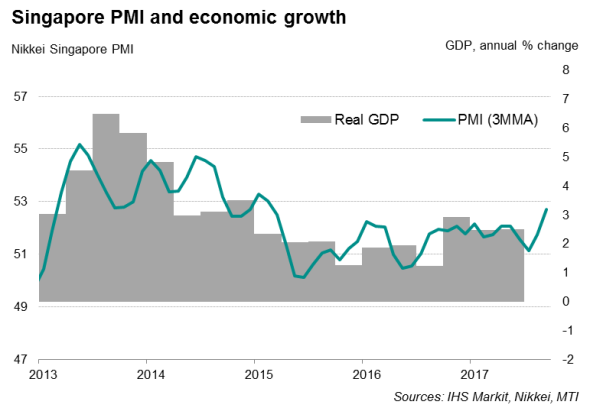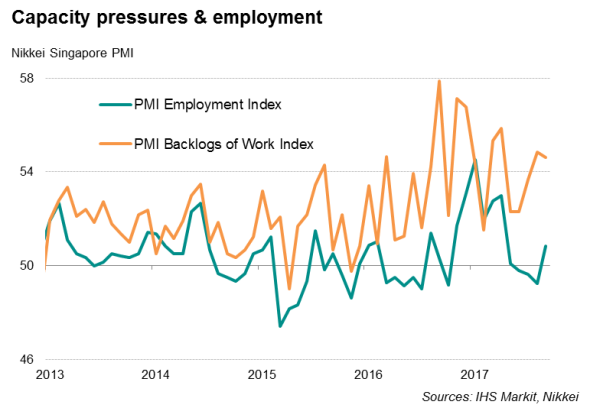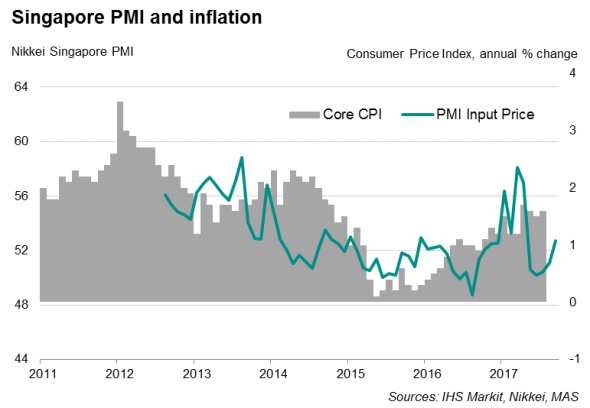Customer Logins
Obtain the data you need to make the most informed decisions by accessing our extensive portfolio of information, analytics, and expertise. Sign in to the product or service center of your choice.
Customer Logins
ECONOMICS COMMENTARY
Oct 04, 2017
Singapore private sector economy gathers pace in third quarter
Singapore's private sector economy shifted into a higher gear at the end of the third quarter, with growth in business activity picking up to its fastest for a year. The latest PMI survey data also point to higher new business inflows, particularly export sales, which bodes well for the economy in coming months.
The headline Nikkei Singapore Whole Economy PMI rose to 53.7 in September, up from 53.2 in August, marking the strongest improvement for over three years. The latest reading took the third quarter average to the highest since the closing quarter of 2014. As such, the survey data point to annual GDP growth of approximately 3% for the three months to September.

The impetus for the upturn continues to come from strengthening client demand, especially from external markets. Export sales have played a key role in pushing order books higher since the start of the third quarter. In fact, inflows of new export orders showed the largest monthly gain in the survey's near-five-year history during September.
Employment
Higher sales once again stretched the capacity of Singapore's private sector, but the upturn has yet to produce any meaningful gain in employment. While September data indicated a renewed rise in staff numbers, after having fallen in the previous three months, the rate of job creation was only marginal. Moreover, anecdotal evidence suggests that the bulk of the gain was again attributed to part-time staff hiring.

While still positive, a dip in business confidence during September suggests that companies are less upbeat about the longer-term outlook. That in turn could have led firms to have a stronger preference for short-term staff, thereby retaining flexibility to adjust manpower as needs be.
Price pressures
With the rise in business activity, there were also signs of increased price pressures, although inflation remained modest. Global commodity prices have stabilised from levels seen earlier in the year while the soft labour market has dampened underlying wage growth.

However, growth, rather than inflation, is likely to be the focus for the Monetary Authority of Singapore. The central bank remains concerned that growth is uneven across sectors. Anecdotal evidence from PMI data revealed that higher sales were noted from a small number of industries, including electronics and chemicals. As such, the MAS will likely maintain its neutral stance in the October policy meeting.
Bernard Aw, Principal Economist, IHS Markit
Tel: +65 6922 4226
Bernard.Aw@ihsmarkit.com
{"items" : [
{"name":"share","enabled":true,"desc":"<strong>Share</strong>","mobdesc":"Share","options":[ {"name":"facebook","url":"https://www.facebook.com/sharer.php?u=http%3a%2f%2fwww.spglobal.com%2fmarketintelligence%2fen%2fmi%2fresearch-analysis%2f04102017-Economics-Singapore-private-sector-economy-gathers-pace-in-third-quarter.html","enabled":true},{"name":"twitter","url":"https://twitter.com/intent/tweet?url=http%3a%2f%2fwww.spglobal.com%2fmarketintelligence%2fen%2fmi%2fresearch-analysis%2f04102017-Economics-Singapore-private-sector-economy-gathers-pace-in-third-quarter.html&text=Singapore+private+sector+economy+gathers+pace+in+third+quarter","enabled":true},{"name":"linkedin","url":"https://www.linkedin.com/sharing/share-offsite/?url=http%3a%2f%2fwww.spglobal.com%2fmarketintelligence%2fen%2fmi%2fresearch-analysis%2f04102017-Economics-Singapore-private-sector-economy-gathers-pace-in-third-quarter.html","enabled":true},{"name":"email","url":"?subject=Singapore private sector economy gathers pace in third quarter&body=http%3a%2f%2fwww.spglobal.com%2fmarketintelligence%2fen%2fmi%2fresearch-analysis%2f04102017-Economics-Singapore-private-sector-economy-gathers-pace-in-third-quarter.html","enabled":true},{"name":"whatsapp","url":"https://api.whatsapp.com/send?text=Singapore+private+sector+economy+gathers+pace+in+third+quarter http%3a%2f%2fwww.spglobal.com%2fmarketintelligence%2fen%2fmi%2fresearch-analysis%2f04102017-Economics-Singapore-private-sector-economy-gathers-pace-in-third-quarter.html","enabled":true}]}, {"name":"rtt","enabled":true,"mobdesc":"Top"}
]}




